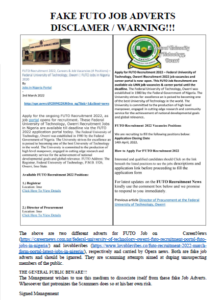- Professor A.B.I. Udedibie, B.Sc. (Animal Science) (UNN): M.Sc., PhD (Cornell); RAS FNSAP; MS.A.N.; M.A.S.N.; Member, African Network for rural Poultry Development, among others. Area of Specialization: Animal Nutrition. Professor Udedibie, an erudite scholar, has brought fame to the Department in particular and the University in general through his breakthrough in jack bean research. He is widely published and ranks high in the authors most cited in the area of alternative feed resources in animal nutrition. In 1989, Professor Udedibie became the Head of this Department, a position he held for 8 fruitful years, during which he worked tirelessly to see the Department grow. Professor Udedibie was serving a second term as Dean of SAAT when he was appointed Deputy Vice-Chancellor (Academic), FUTO (2001-2005).
Professor B.O. Esonu, B. Agric. Tech. (Animal Production) (FUTO); M.Sc., Ph. D Animal Nutrition (FUTO); RAS, MNSAP; MASN; MNYAS; MASAN; MWPSA; MASAS among others. Area of Specialization: Animal Nutrition. Professor Esonu was Head, Department of Animal Science and Technology (2005- 2006), University Alumni Relation Officer (2006 -2011) and Director, Centre for Agricultural Research (2011 -2012) and currently, Dean, School of Agriculture and Agricultural Technology.
Professor N.J. Okeudo, B. Agric. Science (Ife); M. Phil. (Ife); Ph. D (Belfast); RAS, MNSAP; MASN; MIFST (UK). Area of Specialization: Animal Products. Professor Okeudo was Head, Department of Animal Science and Technology (2001-2003) and Director, Anticorruption and Transparency Unit (ACTU). Currently the Deputy Vice-Chancellor Academics, FUTO.
Professor G.A. Anyanwu, B. Agric. Animal Science (UNN); M.Sc. Animal Science (Ibadan); PhD Animal Nutrition (FUTO); RAS MNSAP; MASN; Area of Specialization: Animal Nutrition. Professor Anyanwu was Head of Department (2003-2005) and Associate Dean, SAAT (2006 – 2008) and Director, FUTO Farms Ltd (2015 – 2016)
Professor I.C. Okoli, DVM (Ibadan); M.Sc. Animal Management (FUTO); PhD (FUTO); MNVMA; MNSAP. Area of Specialization: Animal Health and Management.
Professor (Mrs) U.E. Ogundu, B.Sc. Animal Science (Ibadan); M.c. Animal Science (ABU): PhD (FUTO); RAS MNSAP; MASN. Area of Specialization: Animal Breeding and Genetics. Prof. (Mrs.) Ogundu was the Ag. Head of Department, (2006-2010) and SAAT SIWES Coordinator (2010 -2012), Director, Office of the University Development (2015 – 2016).
Professor M.C. Uchegbu, B. Agric. Animal Science (UNN); M.Sc. Animal Nutrition (FUTO); PhD (FUTO); RAS MNSAP; MASAN, MASN, MWPSA, Area of Specialization: Animal Nutrition. Prof. Uchegbu was Ag. Head of Department (2010 – 2012).
Professor O.O. Emenalom, B. Agric. Tech. Animal Production (FUTO); M.Sc., PhD Animal Nutrition (FUTO); RAS, MNSAP; MASAN, MNSN, MWPSA; Area of Specialization: Animal Nutrition. Prof. Emenalom was SAAT SIWES Coordinator (2003 -2006) and Ag. Head of Department 2012 – 2014), Head of Department (2014 – 2015).
Professor E.B. Etuk, B. Agric. Tech. Animal Production (FUTO); M.Sc., PhD Animal Nutrition (FUTO); RAS, MNSAP; MASAN; MASN; MWPSA: Area of Specialization: Animal Nutrition. Dr Etuk was the Associate Dean, SAAT (2012 – 2014), Associate Dean, Students Affairs (2014 – 2015) and Ag. Head of Department (2015-2017)
Professor C.T. Ezeokeke, B.Sc. Agric. Biochemistry and Nutrition; M.Sc. Agric. Biochemistry; PhD (Ibadan); RAS MASAN; MNSAP; Reader. Area of Specialization: Animal Nutrition and Biochemistry. Ag. Head of Department (2017-2019).
Dr. (Mrs). H.O. Obikaonu, B. Agric. Tech. Animal Production (FUTO); M.Sc., PhD Animal Management (FUTO); RAS, MNSAP; Reader. Area of Specialization: Animal Management. Dr. (Mrs.) Obikaonu was a Deputy Director, Linkages and Advancement Unit (2011 – 2013) and current Ag. Head of Department.
Prof. I.F. Etuk. B. Agric. Animal Science (Uyo) M.Sc.(Ife), PhD (Umudike) RAS, MNSAP; MASAN; Reader. Area of Specialization: Animal Physiology
Dr V.M.O. Okoro, B. Agric. Tech. (FUTO); M.Sc. (Ibadan); PhD (Umudike); RAS, MNSAP; MASAN; MGSN; MWPSA; Reader. Area of Specialization: Animal Breeding and Genetics.
Dr N.J. Anyanwu, B. Agric. Tech. (FUTO); M.Sc. (RSUST); RAS; MNSAP; MASAN; MWPSA; Senior Lecturer. Area of Specialization: Pasture and Range Management.
Dr I.P. Ogbuewu, B. Agric. Tech. (FUTO) Animal Science and Tech. (FUTO); M.Sc., PhD (FUTO); RAS, MNSAP; MASAN; Senior Lecturer. Area Specialization: Animal Reproductive Physiology.
Dr V.U. Odoemelam, B. Agric. (Umudike); M.Sc., PhD (Umudike); RAS MNSAP; MASAN; NIAS; Senior Lecturer. Area of Specialization: Livestock Production and Management.
Dr N.O. Aladi, B. Agric. Tech. (FUTO); M.Sc, PhD (FUTO); RAS, MNSAP, MASN; MASAN; Senior Lecturer. Area of Specialization: Animal Products Technology.
Dr C. C. Ugwu, DVM (UNN); M. Sc (UNN) Lecturer I. Area of Specialization: Animal Health & Animal Microbiology.
Dr Mrs O.E. Kadurumba, B. Agric. (Umudike); M.Sc. (Umudike), PhD (FUTO), RAS, MASAN, MNSAP, Lecturer I. Area of Specialization: Animal Genetics and Breeding.
Miss. F. C. Egenuka, B. Agric. Tech. (FUTO); M.Sc (FUTO) Lecturer I; Area of Specialization: Animal Products
- Dr T. C. Iwuji B. Agric. Tech. (FUTO); M.Sc (Umudike); PhD (Umudike), RAS, MASAN, MNSAP. Lecturer I. Area of Specialization: Animal Physiology.
Dr U. E. Ahiwe, B. Agric. Tech. (FUTO); M.Sc (FUTO), PhD (Adelaide); RAS, MASAN, MNSAP Lecturer II. Area of Specialization: Animal Nutrition.
Dr Mrs P. C. Okere, B. Agric. (CAL); M.Sc (FUTO); PhD (FUTO) RAS, MASAN, MNSAP. Lecturer II. Area of Specialization: Animal Management.
Mrs C. U. Ezetoha, B. Agric. Tech. (FUTO); M.Sc (FUTO), Assistant Lecturer. Area of Specialization: Animal Products.
Mr C. P. Ukwu, B. Agric. Tech. (FUTO); M.Sc (FUTO), Assistant Lecturer. Area of Specialization: Animal Management.
Mr I. Ejiofor, B. Agric. (IMSU); M.Sc (MOUAU), Assistant Lecturer. Area of Specialization: Animal Physiology.
Dr A. I. Zanwa, DVM, (UNIMAID); Assistant Lecturer. Area of Specialization: Animal Health.
Mr Ifeanyi Solomon Ahamba, B.Agric. Tech (FUTO), Graduate Assistant. Area of Specialization: Animal Breeding and Genetics.
Mr Ajeh Lawrence, Giwa, B. Agric (Nasarrawa), Graduate Assistant. Area of specialization: Animal Production and Management.
Miss. O. C. Ndu bueze, B. Agric (IMSU) Graduate Assistant. Area of specialization: Environmental Biology.
Mrs A. Y. Unachukwu, B. Agric (IMSU) Graduate Assistant. Area of specialization: Animal physiology.
Mr S. Abubakar B. Agric (NASARRAWA) Graduate Assistant. Area of specialization: Environmental Biology.


 CATTLE BREED UNIT
CATTLE BREED UNIT LABORATORY FUME CUPBOARD
LABORATORY FUME CUPBOARD












